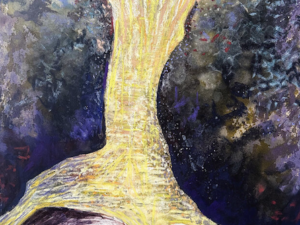“Jesus calls us to exactly what Zen masters call their students. I once stayed in a Zen monastery in Japan. The master was calling monks who had been there for years to have what they named “beginner’s mind.” Similarly, one of Jesus’ favorite examples is a child. Every time the disciples are tempted to get into their heads, into their religious smugness, or to settle the dust before they’ve learned its lessons, Jesus brings a child in front of them.
In Matthew 18:3, and I’m paraphrasing, Jesus says, “I’m telling you once and for all, if you do not go back to square one and start over like a child, you will never be able to see the new reality.” In other places, similar advice follows on the disciples’ rather heady discussion around divorce. It is at that point Jesus brings out a child (Mark 10:15). Another time the disciples are discussing the possibility of celibacy. Their conversation is only on the theoretical level, and Jesus brings a little child out (Matthew 19:14). Notice when Jesus counsels the beginner’s mind. Every time he welcomes little children, it’s when the disciples are discussing topics that to this day lend themselves to heady, ideological discussions. One group can come down as right and the other group can come down as wrong. Basically, Jesus says it’s a waste of time. He’s telling them, “You’re not seeking truth; you’re seeking to be in control.”
Jesus says the only people who can recognize and be ready for what he’s talking about are the ones who come with the mind and heart of a child. It’s the same reality as the beginner’s mind. The older we get, the more we’ve been betrayed and hurt and disappointed, the more barriers we put up to the beginner’s mind. We move further away from the immediate delight and curiosity of small children. We must never presume that we see, and we must always be ready to see anew. But it’s so hard to go back, to be vulnerable, and to say to our soul that “I don’t know anything.”
Try to say that: “I don’t know anything.” We used to call it tabula rasa in Latin. Maybe we could think of ourselves as an erased blackboard, ready to be written on. By and large, what blocks spiritual teaching is the assumption that we already know, or that we don’t need to know. We have to pray for the grace of beginner’s mind. We need to say with the blind man, “I want to see” (Mark 10:51).
Spirituality is about seeing. It’s not about earning or achieving. It’s about relationship rather than results or requirements. Once we see, the rest follows. We don’t need to push the river, because we’re in it. The life is lived within us, and we learn how to say yes to that life.”
by Richard Rohr
(Thank you Google Images for the photos)
5 Comments
-
Amen.
-
oh yesssssss
-
What a great post today Polly. Thank you. The idea of childlike thought or “beginner’s mind” reminds me of the first words of the Bible in Genesis 1…”In the beginning…” [in the only…the good]. “ And God saw everything He had made, and behold, it was very good.” Gen 1:31. This pure childlike mind is something to claim for sure! Thanks for this reminder, through this writing of Richard Rohr.
-
Great thought! In order to be spiritually mature, one must be willing to return and discover the childlike trust and understanding of God that they already knew before.
-
Thanks, Polly.
Spending time with my grandchildren helps me to see things through their eyes. It is precious! X








